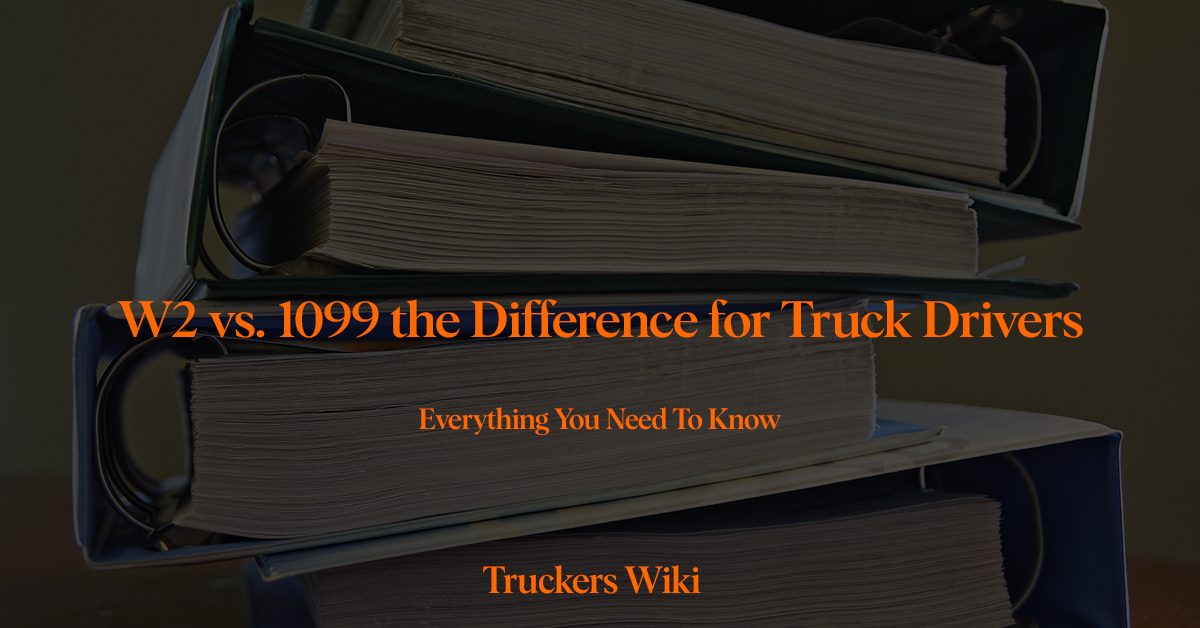
Table of Contents
W2 and 1099 the Difference for Truck Drivers
Before diving into the specifics for truck drivers, it’s crucial to understand what W2 and 1099 forms are in the general sense. The IRS uses these forms to track income earned by individuals throughout the year.
A W2 form is used by employers to report an employee’s annual income and tax withholdings. If you’re a truck driver working as an employee for a company, you’ll likely receive a W2 form.
On the other hand, a 1099 form is typically used to report income earned by independent contractors or self-employed individuals. If you’re a truck driver operating as an owner-operator or lease-operator, you’re more likely to receive a 1099 form.
W2 for Truck Drivers
Regular Income and Benefits
As a W2 truck driver, you are considered an employee of the trucking company you work for. This employment status means you can expect a regular paycheck, regardless of the number of loads you haul. Your income as a W2 employee is relatively stable, which can be a significant advantage for financial planning.
In addition to regular income, W2 truck drivers often have access to benefits like health insurance, retirement plans, and paid time off. These benefits can greatly add to your total compensation and provide additional financial security.
Tax Withholdings
Taxes for W2 truck drivers are relatively straightforward. The trucking company you work for will automatically withhold income tax, social security tax, and Medicare tax from your paycheck. At the end of the tax year, you’ll receive a W2 form detailing your earnings and the amount of taxes withheld.
This structure simplifies tax filing for W2 truck drivers. You don’t have to worry about estimating and setting aside money for taxes – it’s already done for you.
1099 for Truck Drivers
Flexibility and Potential for Higher Income
As a 1099 truck driver, you’re considered self-employed. You might be an owner-operator, lease-operator, or an independent contractor driving a company’s truck. This employment status offers a great deal of flexibility. You have the freedom to choose which loads to take, when to work, and which routes to drive.
The potential income for 1099 truck drivers can be higher than for W2 drivers since you’re paid for each load you haul. If you’re willing and able to take on a lot of work, you can significantly increase your earnings.
Expense Deductions
One of the significant advantages of being a 1099 truck driver is the ability to deduct business-related expenses on your taxes. These expenses can include maintenance and repairs, fuel, insurance, truck payments, and even meals during long hauls. These deductions can greatly reduce your taxable income, potentially leading to significant tax savings.
However, keep in mind that you’ll need to keep careful records of your expenses, as you’ll need to report them accurately on your tax return.
Tax Responsibilities
As a 1099 truck driver, you’re responsible for your own tax withholdings. Unlike W2 employees, taxes are not automatically taken out of your pay. Instead, you’re expected to make estimated tax payments throughout the year.
This aspect requires careful planning and discipline to ensure you’re setting aside enough money to cover your tax obligations. You’ll also likely need to file quarterly tax returns, which can increase the complexity of your tax situation. At the end of the tax year, you’ll receive a 1099 form detailing your earnings but not tax withholdings – because that’s on you.
Lack of Benefits
One downside of being a 1099 truck driver is the lack of employer-provided benefits. You’ll be responsible for securing and paying for your own health insurance, retirement savings, and other benefits. These costs can add up and should be factored into your overall financial planning.
Making the Choice Between W2 and 1099
Ultimately, the choice between being a W2 or 1099 truck driver comes down to your personal circumstances, career goals, and financial situation. Both options have their pros and cons, and what works best for one driver might not work for another.
If you value stability, prefer a straightforward tax situation, and want access to employer-provided benefits, then being a W2 truck driver could be the right choice for you.
On the other hand, if you value flexibility, are willing to take on additional tax responsibilities, and are attracted by the potential for higher income and business-related expense deductions, then being a 1099 truck driver could be a good fit.
Before making a decision, it’s a good idea to consult with a tax professional or financial advisor. They can help you understand the potential financial implications and tax responsibilities of each option, enabling you to make an informed choice.
Whether you’re a W2 or 1099 truck driver, the open road offers plenty of opportunities. Understanding the differences between these two forms of employment can help you navigate your career and financial journey with confidence.
Learn more about W2 here.
Learn more about 1099 here.
Employal article on W2 and 1099 difference for truck drivers.
Listen to The Article Here
Last modified: February 3, 2024

